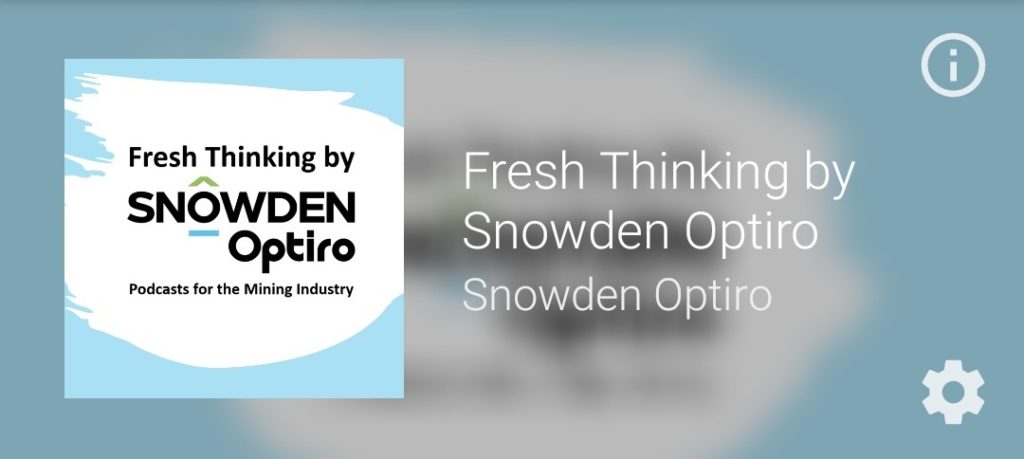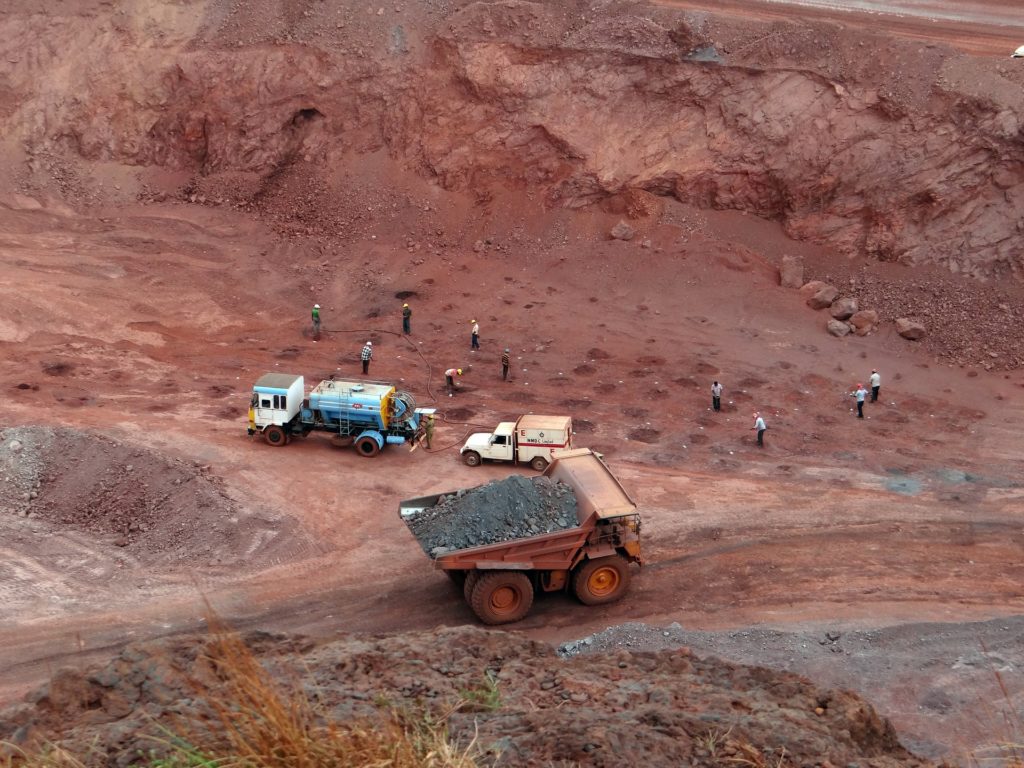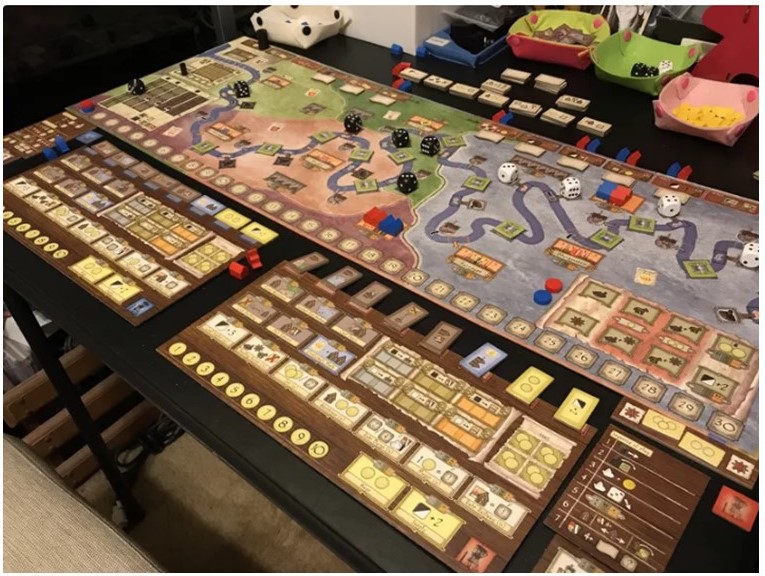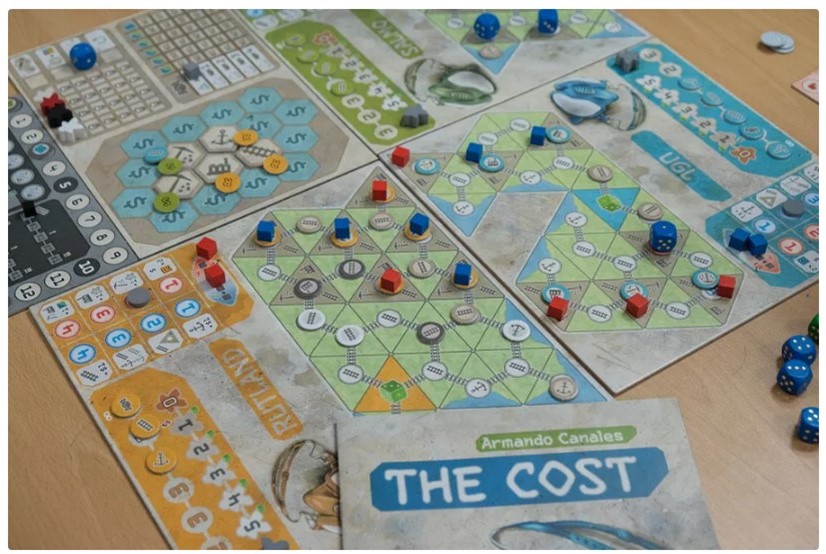
Podcasts. There are thousands of them out there, free for anyone to access. I regularly listen to them on all sorts of topics ranging from sports, politics, and even mining. This blog post is about my top mining podcasts that I find entertaining and/or educational. There are likely others missing from this playlist, but one only has so much time in a day.
 On YouTube, there are also a lot of educational videos related to mining. Some of the same audio podcast episodes are also available on the YouTube platform. Given an option, I prefer the audio-only podcast format over YouTube.
On YouTube, there are also a lot of educational videos related to mining. Some of the same audio podcast episodes are also available on the YouTube platform. Given an option, I prefer the audio-only podcast format over YouTube.
One doesn’t need to sit there focusing on a video screen. With podcasts, you can do other things at the same time, like exercise, walk the dog, drive a car, etc. One has freedom to multi-task, something that the video format doesn’t allow.
When listening to podcasts, I used the Android phone app called Podcast Addict. However, most likely there are plenty of other smartphone apps to use.
Mining Podcast Categories
In my experience, mining podcasts typically fall into one of two categories; Mining Investment; and Technical Discussions.
Mining Investment: These are the investor targeted interviews, chatting with corporate executives or newsletter writers. They discuss what is new with their companies or what is happening in the industry. From an engineer’s perspective (not as an investor), I listen to a few of these to catch up on projects that I worked on in the past, or to learn how different executives strategize. These interviews are often paid for promotions by the company, so sometimes the interview questions can be the softball type. I’m not sure how often the interview questions are actually provided in advance.
Technical Discussions: There are also a few podcasts related to technical discussions on geology, exploration methods, resource modelling, mining software, and mining services. I have not found any podcasts specifically related to mine engineering or mineral processing. Most are geared towards the geological and exploration aspects of the industry.
 Pick and choose. One can’t listen to all the podcast episodes available or else you wouldn’t have time to do anything else in life. You would also become bored since much of it can be repetitive.
Pick and choose. One can’t listen to all the podcast episodes available or else you wouldn’t have time to do anything else in life. You would also become bored since much of it can be repetitive.
Therefore, I follow multiple podcasters, get updates on their new episodes, and then pick and choose from there. I probably only listen to 10%-20% of the episodes, i.e. only those that are of real interest to me.
Sometimes, especially with investor presentations, the same executives will appear on multiple podcasts. You only need to hear the story once. As well, some executives will be returning frequently to the same podcast with not a lot new to say from their last interview. They need to catch the eyes of investors.
The podcast host will have a lot to do with the style of discussion. Some are better than others. Sometimes the interviewing style is dull and unexciting, even through the topic itself may be great. The following are some of the mining podcasters that I follow.
Mining Investment Podcasts
-
This list are my favorites, in order of preference. They are the only ones I follow
-
 Mining Stock Education (680 episodes) https://www.miningstockeducation.com/ This podcast can have some lively discussion that focus on both the positives and negatives of mining investment. Some guests definitely provide great learnings on the inner workings of the industry.
Mining Stock Education (680 episodes) https://www.miningstockeducation.com/ This podcast can have some lively discussion that focus on both the positives and negatives of mining investment. Some guests definitely provide great learnings on the inner workings of the industry. -
Crux Investor (2500 episodes) https://www.cruxinvestor.com/ Matthew and Merlin have an engaging interview style, and sometimes will have a hard edge, putting interviewees on the spot. They say they “…exist to cut through the jargon, bias and bluster.”
-
Mining Stock Daily (2800 episodes) Mining Stock Daily, hosted by Trevor Hall, provides a daily 8 minute overview of overnight mining news and will also have long form discussions on finance, macro economics, and corporate exploration news.
-
Global Lithium Podcast (130 episodes) is hosted by Joe Lowry, known as “Mr Lithium” who is a 30 plus year industry veteran. For me, this podcast is the “go to” on everything lithium, whether brines or hard rock production.
-
Money of Mine (170 episodes) This Aussie mining podcast focusses mainly on Aussie companies, but the three hosts have an interesting style and not afraid to say what they think. Listening to their Aussie accents always makes me think of the Crocodile Dundee movies.
Technical / Informational Mining Podcasts
These are podcasts on the informational and technical side of mining. Unfortunately for we engineers, they mainly focus on geology.
-
 Fresh Thinking by Optiro-Snowden (53 episodes) This podcast is hosted by Snowdon – Optiro consultants. They typically focus on resource modelling and grade reconciliation aspects. The episodes are fairly short (15 mins), which is nice. Although I am not a resource modeller, I can always learn more about the black art of resource modelling.
Fresh Thinking by Optiro-Snowden (53 episodes) This podcast is hosted by Snowdon – Optiro consultants. They typically focus on resource modelling and grade reconciliation aspects. The episodes are fairly short (15 mins), which is nice. Although I am not a resource modeller, I can always learn more about the black art of resource modelling. -
The Northern Mining Podcast (400 episodes) This podcast provides general industry news, as the Northern Miner newspaper does. It also has interviews with key industry players, but generally avoids the company investor relation interviews.
-
Discovery to Recovery (50 episodes) This is a podcast produced by the Society of Economic Geologists (SEG), brings geoscience and technology stories from the world of ore deposits. This podcast can be harder to listen to, getting heavy into geology discussions beyond my expertise.
-
Exploration Radio (73 episodes) This is a podcast focusing on the past, present and future of exploration. They don’t seem to post very often, but can have interesting topics, even for an engineer.
That is the end of my list.
 To the best of my knowledge, there are a lack of podcasts related to mine engineering, for topics such as pit optimization, mine design, scheduling, equipment selection, and costing.
To the best of my knowledge, there are a lack of podcasts related to mine engineering, for topics such as pit optimization, mine design, scheduling, equipment selection, and costing.
There is one podcast on mine scheduling by Mark Bowater, author of “Crimes Against Mine Planning”, but I cannot find it on any podcast platform.
Another honorable mention is Antonio at https://www.youtube.com/@ResourceTalks/ who does a great job at interviewing executives. The downside is that I don’t think he is on audio-podcast format and his episodes are over 1 hour, or 3600 seconds as he likes to present it. That’s beyond my normal attention span.
Update: A follower of my blog posts has suggested a mining investing site on YouTube called “Junior Resource Investing“. The host is Matthew Mick, seems to have a preference for Ni and base metal projects, interviews are up to 50 minutes each with well prepared questions. Check it out. I can’t find it on a podcast platform as of yet.
Conclusion
 There is no shortage of material in the podcast world about the mining industry. It all depends on what interests you the most. There is even more mining information available on YouTube, if you have the time to sit and watch videos. Nevertheless the audio-only platform is great, although you don’t get to see the charts being discussed. That’s fine with me, particularly if they take a few seconds to describe the chart.
There is no shortage of material in the podcast world about the mining industry. It all depends on what interests you the most. There is even more mining information available on YouTube, if you have the time to sit and watch videos. Nevertheless the audio-only platform is great, although you don’t get to see the charts being discussed. That’s fine with me, particularly if they take a few seconds to describe the chart.
Let us know what mining podcasts you enjoy and would recommend. I have room to add one more to my list of 9 mining podcasts. I don’t actually have 10 favorites yet.



 This game is part of a coal-mining game trilogy created by Thomas Spitzer in Germany. The players take the role of farmers with opportunities to exploit the presence of coal in the Ruhr region of Germany. During the game, players acquire knowledge about coal, extend their farms, and dig deeper in the ground to extract more coal.
This game is part of a coal-mining game trilogy created by Thomas Spitzer in Germany. The players take the role of farmers with opportunities to exploit the presence of coal in the Ruhr region of Germany. During the game, players acquire knowledge about coal, extend their farms, and dig deeper in the ground to extract more coal. In the second game of Spitzer’s trilogy, you are still in the Ruhr region in the 18th century, at the beginning of the industrial revolution. The Ruhr river presented a transportation route from the coal mines. However, the Ruhr was filled with obstacles and large dams, making it incredibly difficult to navigate.
In the second game of Spitzer’s trilogy, you are still in the Ruhr region in the 18th century, at the beginning of the industrial revolution. The Ruhr river presented a transportation route from the coal mines. However, the Ruhr was filled with obstacles and large dams, making it incredibly difficult to navigate. This game may still be in German text only. Players are the administrator of a coal mine, and experience competition while living through a piece of Ruhr Valley history.
This game may still be in German text only. Players are the administrator of a coal mine, and experience competition while living through a piece of Ruhr Valley history. This game takes on a more negative view of the mining industry. It is described as “A bold take on the economics in the brutal industry that is asbestos.” The game players assume the role of a global asbestos company.
This game takes on a more negative view of the mining industry. It is described as “A bold take on the economics in the brutal industry that is asbestos.” The game players assume the role of a global asbestos company. In 1983 my brother, at the age of 10, got his Commodore 64 computer and was eagerly learning to program in BASIC. He was always looking for ideas on what he could write programs about. I had graduated from McGill in Mining Engineering a few years earlier, so I suggested he write a simple computer game about mining as his project.
In 1983 my brother, at the age of 10, got his Commodore 64 computer and was eagerly learning to program in BASIC. He was always looking for ideas on what he could write programs about. I had graduated from McGill in Mining Engineering a few years earlier, so I suggested he write a simple computer game about mining as his project. Over the last few months I decided to learn VBA (Visual Basic for Applications). VBA is a programming language the works with Microsoft Office products, mainly Excel.
Over the last few months I decided to learn VBA (Visual Basic for Applications). VBA is a programming language the works with Microsoft Office products, mainly Excel.

 Mining has been a part of my life for as long as I can remember. Being born in Sudbury, many of my family members have been, or are currently involved, in mining through a variety of occupations, including my father who I idolized. However, I never knew my true interest in the industry until my 11th-grade technology class. I had a teacher who was passionate about the mining industry, and he created a project that involved developing a very basic mine design.
Mining has been a part of my life for as long as I can remember. Being born in Sudbury, many of my family members have been, or are currently involved, in mining through a variety of occupations, including my father who I idolized. However, I never knew my true interest in the industry until my 11th-grade technology class. I had a teacher who was passionate about the mining industry, and he created a project that involved developing a very basic mine design. Before my first year of university, I had a summer job tramming at Macassa Mine in Kirkland Lake Ontario, which has been in production since 1933. My mentality was to get the boots on the ground and get the job done, whatever it took (with proper safety precautions of course). Using rail systems, dumping ore cars manually, jackleg drilling, etc. gave me the perspective that mining was archaic, mining was rough, and mining was only about the ounces.
Before my first year of university, I had a summer job tramming at Macassa Mine in Kirkland Lake Ontario, which has been in production since 1933. My mentality was to get the boots on the ground and get the job done, whatever it took (with proper safety precautions of course). Using rail systems, dumping ore cars manually, jackleg drilling, etc. gave me the perspective that mining was archaic, mining was rough, and mining was only about the ounces. To change the negative view around mining, I believe the main focal point should be electric equipment and the ability for remote operation/work. With all this newly developed technology at our fingertips, I know that future operations will be safer and more sustainable, which should be better portrayed.
To change the negative view around mining, I believe the main focal point should be electric equipment and the ability for remote operation/work. With all this newly developed technology at our fingertips, I know that future operations will be safer and more sustainable, which should be better portrayed. Even creating a mining simulation video game where you can run through a story of being a manager, excavator/scoop operator, truck driver, etc. would get the thought of mining brought into the coming generations at a younger age. This would increase the talent pool from the more typical operator because more and more youth are getting skilled at remote operation through video games due to their increased screen time.
Even creating a mining simulation video game where you can run through a story of being a manager, excavator/scoop operator, truck driver, etc. would get the thought of mining brought into the coming generations at a younger age. This would increase the talent pool from the more typical operator because more and more youth are getting skilled at remote operation through video games due to their increased screen time. People get comfortable and people are afraid to leave home, so selling a career that allows for boundless flexibility in job tasks and constant stimulation while living wherever you desire could allow a shrinkage in the current technical gap.
People get comfortable and people are afraid to leave home, so selling a career that allows for boundless flexibility in job tasks and constant stimulation while living wherever you desire could allow a shrinkage in the current technical gap. So do I think the mining industry is archaic…. not anymore.
So do I think the mining industry is archaic…. not anymore. Firstly, I would like to thank this engineer for taking time to write out his well formed thoughts, and for allowing me to share them.
Firstly, I would like to thank this engineer for taking time to write out his well formed thoughts, and for allowing me to share them.

 Its the right thing to do
Its the right thing to do The company gets a chance to learn about potential employees and also gets productive service from them.
The company gets a chance to learn about potential employees and also gets productive service from them.